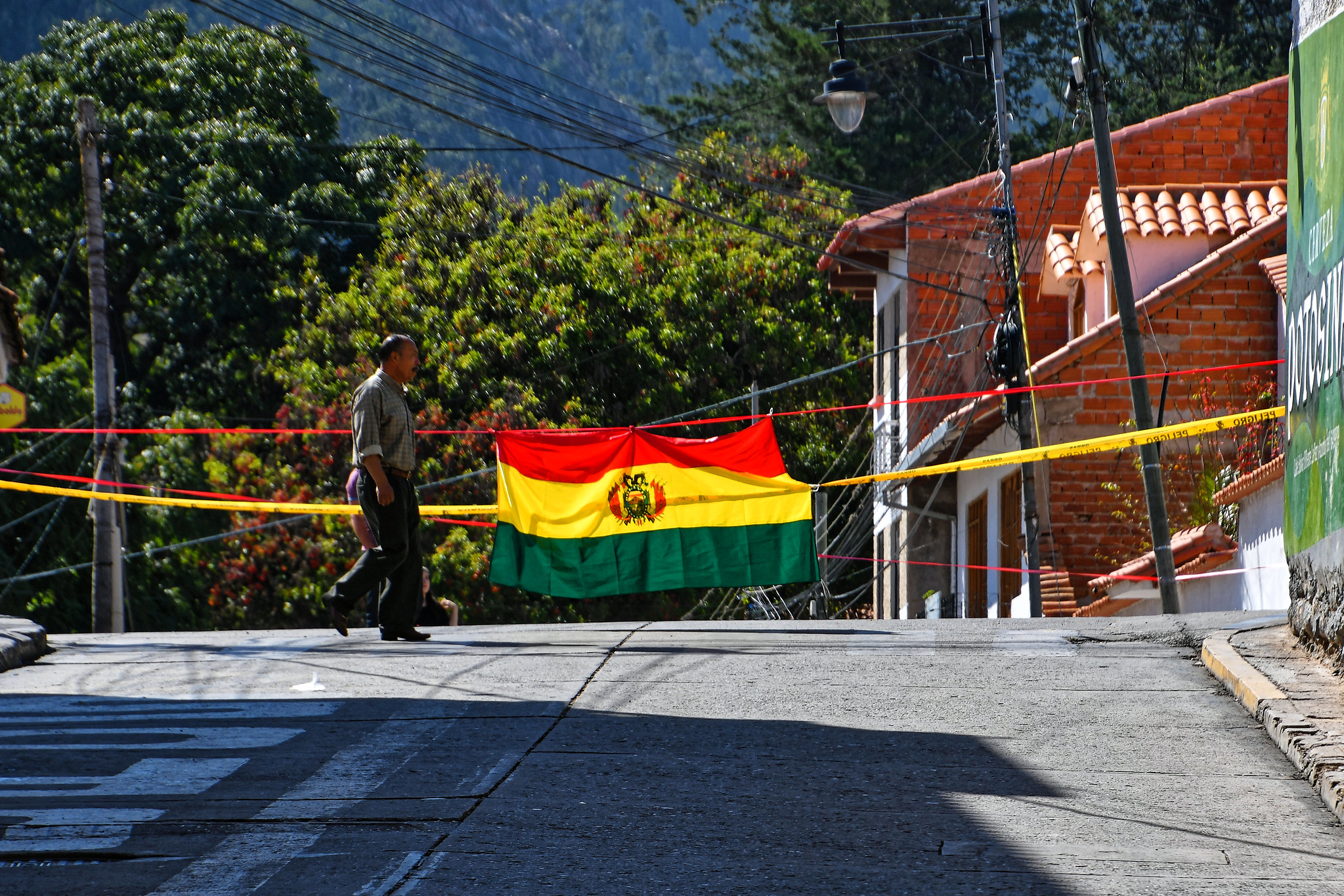
On 22 January, in celebration of Bolivia’s Day of the Plurinational State, exiled former president Evo Morales addressed a packed-out stadium in Buenos Aires, Argentina, affirming his commitment to the struggle for social liberation in Bolivia. His speech came as Bolivia is embroiled in a devastating crisis of democracy after a military-civic coup in October 2019.
The interim government, headed by right-wing Christian president Jeanine Áñez, has issued highly politicised and arbitrary arrest warrants against a plethora of politicians and civilians associated with Morales’ party, the Movement towards Socialism (MAS). Morales, the first indigenous president of Bolivia, was elected in 2005 and during a 14-year tenure slashed poverty rates, reduced inequality and nationalised industries.
Armed police now flank the Mexican embassy where seven ex-ministers, an ex-governor and numerous ex-officials take refuge from political persecution. Even the babysitter of an ex-minister was questioned by police, while the father of a ex-MAS representative has been arrested for ‘digital warfare’. His alleged offence? Sharing memes critical of the government.
An ex-employee of the Agetic, the government communications agency created by the MAS, spoke to Novara Media on condition of anonymity for fear of reprisals.
“The new government entered by force and has adopted a revanchista (vengeful) position. And sadly my colleagues are victims of this,” she says. Nicolás Laguna, the former director of the Agetic, has an arrest warrant outstanding and is claiming asylum in the Mexican embassy. “The government’s only interest is persecution.”
“This government wants to conduct a presidential election in silence,” she adds. “They want to punish dissidents and those associated with the MAS.”
Freedom of the press has largely vanished under a sustained assault by the de facto government. Rural radio stations have been shut down and their staff harassed, a move condemned by the Bolivian human rights ombudsman. On New Year’s Eve, journalists Alejandra Salinas, Orestes Sotomayor and Yesmy Marquez were detained and accused of “inciting terrorism” and “sedition” for criticising the government on blogs and social media.
The government is assisted on the streets by paramilitary activism masquerading as civic ‘resistance’. In rural areas, there have been violent attacks by gangs against MAS-supporting trade unionists. A fortnight ago, Felix Coche Flores, ex-leader of the La Asunta Federation, was viciously beaten by government supporters during a union meeting in the Yungas region. Ex-minister Carlos Romero was hospitalised for stress and dehydration after groups of far-right civilians prevented food and water from entering his home.
Despite being a transitional regime, the government has already announced sweeping changes which far exceed its mandate. It has re-established diplomatic ties with the USA and Israel, while suspending relations with long-time ally Cuba. It has also announced plans to cut social welfare programmes and privatise the economy.
New elections are scheduled for 3 May, but the right is disunited and split between Carlos Mesa, who ran in the 2019 elections, and Áñez, the ‘caretaker’ president who is running despite having vowed not to back in November. Also in the race is businessman Luis Fernando Camacho, the mastermind of the coup who has links to far-right youth groups. He is hoping to bridge the historic east-west divide in an alliance with Marco Pumari, but all signs so far indicate his appeal beyond elites in Santa Cruz is minimal. On a recent visit to a market in La Paz, he was met with furious chants of “murderer” and pelted with rubbish.
Other conservative candidates include ex-president ‘Tuto’ Quiroga, and ‘Chi’, a wealthy evangelical Christian pastor who surprised many by scooping 8% of the vote in the October election. Despite pleas by all candidates for unity, none can actually bring themselves to eschew ambitions of power and withdraw to avoid splitting the anti-MAS vote.
Meanwhile the MAS presidential candidate is Luis Arce Catacora, the ex-economy minister and architect of prosperity and nationalisation under Morales. He is joined by David Choquehuanca for vice-president, an ex-foreign minister and leading figure in the indigenous wing of the MAS.
That Arce and Choquehuanca are perceived as a safe pair of hands is clear. The veteran politicians have been touted by the MAS as a winning combination of urban and rural-indigenous sectors; Morales has described the two as a “combination of scientific knowledge and ancient millenary knowledge”.
The decision to opt for Arce – who is credited with overseeing the strong growth of the past 14 years – is a pragmatic move, but it has opened up fault lines of conflict within the MAS base. Arce has described himself as a “representative of the middle class” and the MAS has been accused by some of capitulating to urban, middle-class interests by overlooking Andronico Rodriquez, the vice-president of the Seis Federaciones de Cocaleros del Trópico de Cochabamba union, who was the favoured candidate of the powerful coca growers of the Chapare.
This highly independent tropical region is a stronghold of MAS support and is home to a large sector of cocaleros (coca growers). It was also where Morales began his political career as a cocalero union leader. Young and charismatic, but highly reminiscent of Morales himself, the MAS evidently felt uneasy about placing him on the ticket at a time when Morales remains a polarising figure.
Indeed it would be a mistake to deny that the MAS has experienced a crisis of legitimacy following the disputed elections in October. It is important that the party now forges a future for itself without Morales, while continuing to repudiate attacks against him. A squeaky clean campaign is vital if the MAS is to succeed against the emboldened far right in the upcoming elections whilst staying true to the social movements which constitute its base. Bolivia’s social movements were central to the toppling of the country’s 20th century dictatorships. The safeguarding of democracy in the 21st now lies in their hands.
Olivia Arigho-Stiles is a PhD candidate currently based in Bolivia researching 20th century highland indigenous movements.